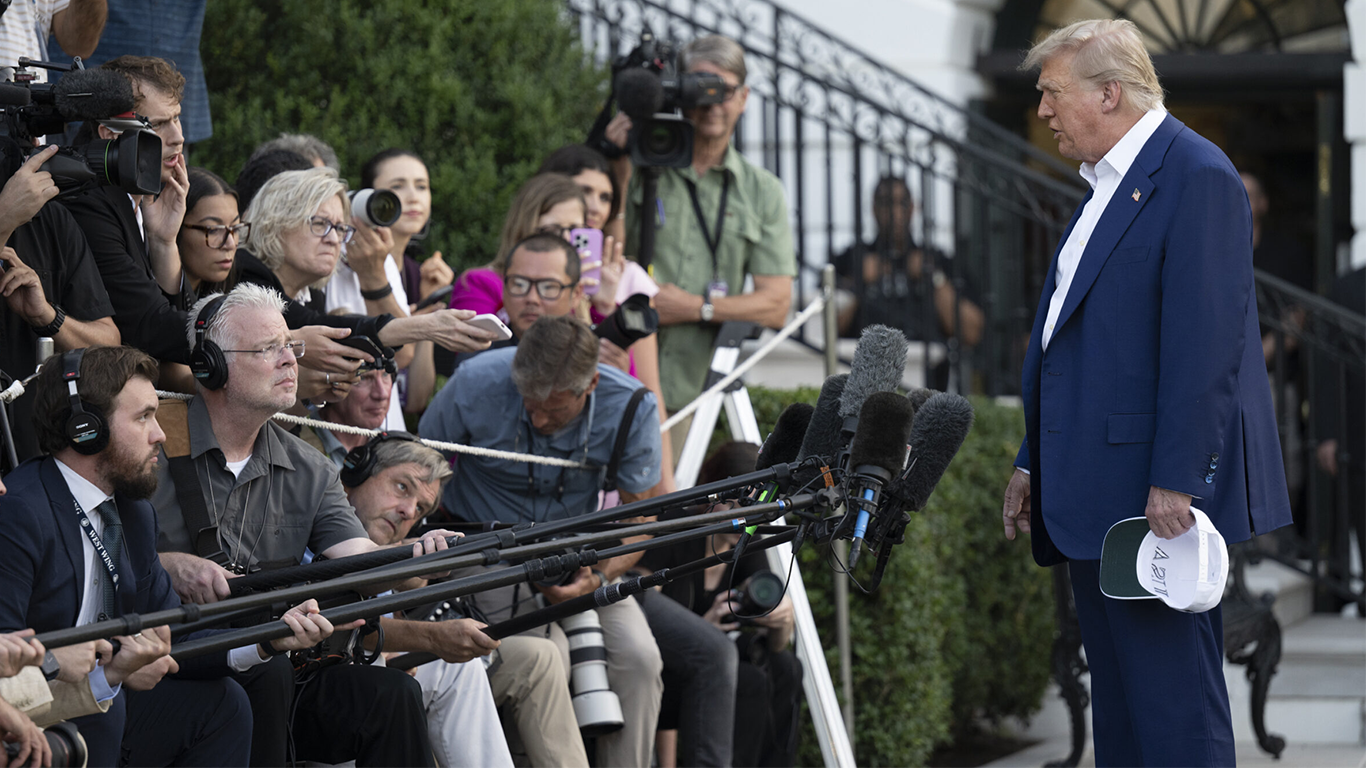WASHINGTON – History is full of muttered presidential curses, closed-door profanity and hot-mic slip-ups. The f-bomb President Donald Trump unleashed Tuesday on the South Lawn stands apart.
Days after dropping bunker-busters on Iran’s key nuclear sites, he dropped an f-bomb on Iran and Israel for violating a ceasefire he’d brokered.
“You know what? We basically have two countries that have been fighting so long and so hard that they don’t know what the f— they’re doing,” Trump told reporters at the White House before boarding Marine One, headed to a NATO summit in the Netherlands.
It was a new level even for a president who has made cussing in public somewhat routine.
LOCAL NEWS: 100 best places to work and live in Arizona for 2025
INDUSTRY INSIGHTS: Want more news like this? Get our free newsletter here
“It’s a substantial violation of presidential protocol for him to use foul language under any circumstances, but particularly this – this word and this setting,” said Russell Riley, co-chair of the Presidential Oral History Program at the University of Virginia’s Miller Center. “This was plainly a point where there were reporters there capturing his utterances, which would be official utterances.”
Many presidents have used bad language in private, even if they professed otherwise.
“They all do,” said presidential historian Martha Joynt Kumar. “The reason they do is the presidency must be one of the most frustrating jobs there is in the world.”
Trump’s frustration with Iran and Israel was evident on the South Lawn, as he vented that both had broken the ceasefire he had announced hours earlier to end their 12-day war.
The f-bomb was hardly the first time Trump has let loose a curse word in public.
“Bulls—” is one of his favorites, unleashed on social media and sometimes from behind a presidential lectern.
In January, after a military helicopter collided with an American Airlines plane about to land at Reagan National Airport across the river from the White House, Trump laid the blame on former Secretary of Transportation Pete Buttigieg.
“He’s a disaster,” Trump said. “He’s just got a good line of bulls—.”
Trump has let loose most often at campaign events.
During a 2016 rally in New Hampshire, he told supporters his policies would bring back businesses from Mexico: “Come back to New Hampshire, and you can tell them to go f— themselves.”
At a rally in Alaska in 2022, Trump recounted a conversation with generals in Iraq about defeating ISIS.
“I’d hit ‘em on the left. I’d hit ‘em on the right. I’d hit ‘em in the f—— center,” he told the crowd.
The day after her boss took aim at Buttigieg, White House press secretary Karoline Leavitt defended the coarse language at a press briefing.
“One of the things the American people love the most about this president is he often says what they were thinking but lack the courage to say themselves,” she said.
Kumar said Trump’s vulgarity comes off as authentic and even endearing for many voters, ”because we know what he thinks. We know who he is. … The public president and the private president – I don’t think it’s too different.”
At a meeting with senators in 2018, Trump referred to Haiti and a number of African nations as “s—hole countries” or “s—holes” from which he wanted to restrict immigration, according to senators in attendance.
In days gone by, politicians would have expected backlash for the sort of profanity Trump employs. The fact that he gets away with it reflects “a shifting change in public morality,” Riley said.
Plus, he said, it’s part of Trump’s “blue-collar, locker room persona.”
Behind closed doors, many presidents were notorious potty mouths – though some of their most quotable comments only surfaced after they left office in memoirs or biographies.
The Watergate tapes revealed a profane Richard Nixon.
During a heated meeting in June 1964 over a U.S. plan to partition Cyprus, Lyndon Johnson, famously crude, told the Greek ambassador, “F— your parliament and your constitution.”
That undiplomatic exchange surfaced in a 1977 book.
Sometimes a hot mic captures an outburst in real time.
Democrat Joe Biden was caught a few times employing colorful language. In January 2022, he called Fox News reporter Peter Doocy “a stupid son of a bitch.” A few months later in Florida as he surveyed hurricane damage, he was overheard telling a mayor, “No one f— with a Biden.”
Republican George W. Bush, who campaigned as an upstanding antidote to the scandals of outgoing Democrat Bill Clinton, got caught by a pesky hot mic two months before Election Day 2000.
Bush, pointing out The New York Times’ Adam Clymer to running mate Dick Cheney at a rally in Illinois, called the reporter a “major league a——.”
Trump-watchers say he has taken the use of bad language by a president to new heights – though his profanity reflects evolving societal norms.
“As with all things Trump, he is unprecedented in his public use of vulgar profanity,” Barbara Perry, a professor of presidential studies at the Miller Center, said by email.
She recalled that John F. Kennedy, whose heroism in the Navy during World War II propelled his political rise, swore like a sailor.
“Other presidents swore,” she said, “but they avoided doing so in public statements. Trump has both coarsened presidential rhetoric in general and specifically in his use of the f-word. Sadly, that once-forbidden epithet is now common in parlance across all facets of American life.”




